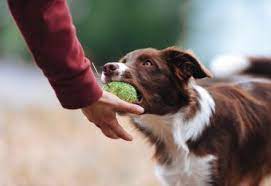Why Are Border Collies Easy To Train


When it comes to dog training, Border Collies are often considered one of the most trainable breeds. Their intelligence, energy, and natural instincts make them highly responsive to training techniques. In this article, we will explore why Border Collies are easy to train and provide valuable insights into their characteristics, training methods, and benefits.
Characteristics of Border Collies
Border Collies possess several characteristics that contribute to their trainability. Understanding these traits is essential to effectively train and communicate with this breed.
Border Collies Intelligence and Trainability
Border Collies are renowned for their exceptional intelligence. Ranking high in canine intelligence tests, they have the capacity to learn and understand commands quickly. This breed thrives on mental stimulation and is eager to please their owners, making them highly trainable.
Energy and Drive
Border Collies are known for their boundless energy and drive. This natural enthusiasm makes them highly motivated during training sessions. They excel in physically demanding tasks and have the endurance to sustain long training sessions.
Border Collies Focus and Work Ethic
One of the key reasons Border Collies are easy to train is their intense focus and strong work ethic. They have an innate desire to work and perform tasks, making them highly attentive during training sessions. This focus enables trainers to effectively communicate and reinforce desired behaviors.
Natural Herding Instinct of Border Collies
Border Collies were originally bred for herding livestock, which has resulted in a strong natural instinct for herding. This instinct can be channeled into various training activities, such as obedience training and agility competitions. Their herding background also contributes to their ability to understand and follow commands.
Positive Reinforcement Training of Border Collies
Positive reinforcement training techniques work exceptionally well with Border Collies. They respond positively to praise, treats, and rewards, reinforcing desired behaviors. By using positive reinforcement, trainers can establish a strong bond and trust with their Border Collie, creating a positive learning environment.
Consistency and Structure in Border Collies Training
Consistency and structure are vital components of training Border Collies. Establishing clear rules and routines helps them understand expectations and boundaries. Regular training sessions, combined with consistent commands and rewards, enable Border Collies to grasp and retain training concepts effectively.
Socialization and Exposure
Proper socialization and exposure play a crucial role in the training process. Early socialization helps Border Collies develop positive behaviors and adapt to various environments. Exposing them to different people, animals, and situations from a young age helps reduce fear and anxiety, contributing to their trainability.
Agility and Obedience Training of Border Collies
Border Collies excel in agility and obedience training. Their athleticism, coordination, and intelligence make them highly competitive in these areas. Engaging in activities such as agility courses and obedience trials not only provides mental and physical stimulation but also enhances their overall training experience.
Border Collies Mental Stimulation and Enrichment
Border Collies thrive on mental stimulation. Incorporating puzzle toys, interactive games, and challenging tasks into their training routine keeps their minds active and prevents boredom. Mental stimulation not only enhances their problem-solving abilities but also strengthens the bond between trainer and dog.
Border Collies Bonding with the Trainer
Border Collies form strong bonds with their trainers. Building a trusting relationship based on mutual respect and understanding is essential for effective training. Spending quality time together, engaging in activities, and using positive reinforcement techniques help strengthen this bond.
Professional Training Assistance
For those seeking professional guidance, enlisting the help of a certified dog trainer experienced in working with Border Collies can be invaluable. These trainers possess the knowledge and expertise to tailor training methods to suit the specific needs of Border Collies, ensuring a successful training experience.
See also: Top 10 Best Training Treats for Puppies: A Guide for New Dog Owners
Training Tips and Techniques
There are several training tips and techniques that can aid in training Border Collies. Some of these include setting clear goals, breaking down commands into manageable steps, using clicker training, and incorporating fun and interactive training sessions. Understanding and implementing these strategies can enhance the training process.
Common Challenges and Solutions for Border Collies Training
While Border Collies are generally easy to train, they may encounter certain challenges along the way. Common issues include excessive herding behavior, overexcitement, and stubbornness. Addressing these challenges through positive reinforcement, consistency, and patience can help overcome them effectively.
The Benefits of Training Border Collies
Training Border Collies offers numerous benefits for both the dog and the owner. Well-trained Border Collies are obedient, well-behaved, and easier to manage. Training also strengthens the bond between the dog and the owner, promotes mental and physical stimulation, and enhances the overall well-being of the dog.
Conclusion
Border Collies’ trainability stems from their intelligence, energy, focus, and natural instincts. By utilizing positive reinforcement techniques, establishing consistency, providing mental stimulation, and building a strong bond, trainers can effectively teach and guide Border Collies. Remember, training is an ongoing process that requires patience, understanding, and dedication to ensure a well-behaved and happy Border Collie.
FAQs about Border Collies Training
How long does it take to train a Border Collie?
Training duration can vary based on factors such as the dog’s age, previous training experience, and individual temperament. However, with consistent training efforts, Border Collies can learn basic commands in a matter of weeks.
Are Border Collies suitable for first-time dog owners?
While Border Collies are highly trainable, their high energy levels and intense drive may not be suitable for inexperienced dog owners. They require dedicated training, mental stimulation, and plenty of exercise to thrive.
Can Border Collies be trained for activities other than herding?
Absolutely! Border Collies excel in various activities, including agility, obedience trials, search and rescue, and even therapy work. Their trainability and versatility make them well-suited for a range of tasks.
How can I prevent my Border Collie from herding children or other pets?
To prevent excessive herding behavior, it is essential to redirect your Border Collie’s focus onto alternative activities. Engage them in interactive games, provide mental stimulation, and teach them appropriate behaviors around children and other pets.
See also: Everything about Potty Train Puppies in an Apartment
What if my Border Collie shows signs of stubbornness during training?
If your Border Collie displays stubbornness, avoid resorting to punishment or harsh training methods. Instead, reassess your training techniques, ensure consistency, and use positive reinforcement to motivate and encourage desired behaviors.




